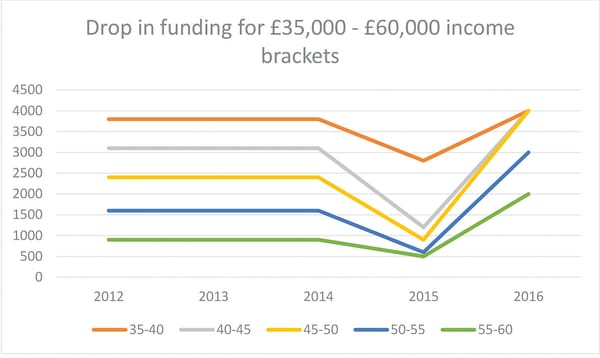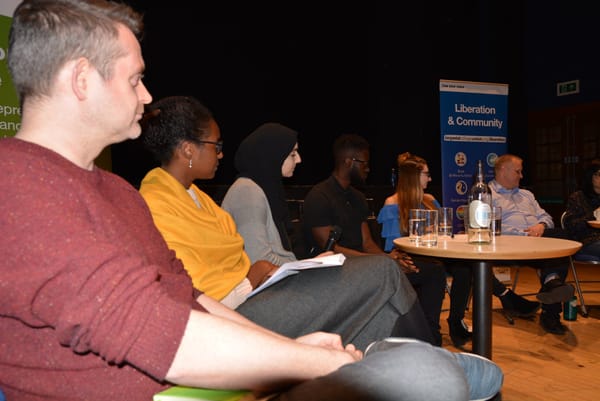What the hell are the SACAs?
And why do they matter?

You’ve been spammed with too many emails, you’ve seen the green posters, flyers and triangular table things in the cafes. Maybe you’ve grabbed a free tea or green apple at one of the stalls or seen someone running around in a ridiculous green morph suit. All just to grab your attention and tell you to nominate a member of staff for a Student Academic Choice Award (SACA). What’s it all for and why should you care? The short answer: this is how we change Imperial. You spending 5 minutes of your time to submit a nomination can make all the difference. Don’t believe me? Let’s see if I can convince you.
Surveys like SOLE, the SES, NSS, PTES and PRES (the major student surveys run at Imperial) make it all too easy to complain about what needs to improve. And we love to make it abundantly clear (trust me, I’ve read through the comments and seen how brutal students can be). Have you ever thought about how hard it must be to read through hundreds of negative comments about you, multiple times per year? I work with these staff every day, it’s part of what I do as Deputy President (Education), and I can tell you that it gets demoralising. Even our best staff that try their hardest to deliver the best possible experience get worn down. There’s no mention of that time when they stayed two extra hours to help someone work through a difficult problem. Nobody has acknowledged that they reply to emails or mark dozens of pieces of coursework over the weekend when they should be spending time with their families. All of that is too easily forgotten. Giving your honest feedback is extremely important, but it’s only half of the solution.
This is where the SACAs come in. The SACAs are a simple, powerful way of recognising all the hard work that staff put in to make our experience just a little bit better. By praising the staff that go the extra mile, the student body sends a clear message that we value excellence, rather than just complain when something isn’t great. By putting five minutes into submitting a nomination, you can (anonymously) tell a staff member that, despite all the ways in which they could improve, you appreciate them and the impact that they’ve made on you during your time at Imperial. That you appreciated that one time that they gave you some solid advice, or that they are trialling innovative teaching methods even if it doesn’t always work out. The SACAs make it easy and mean so much to staff. See for yourself:
“I felt really honoured to be nominated. I take care to deliver the best teaching I can and receiving a nomination from the students makes a big difference to the way I feel about spending that extra time.” - Nominee
“It was great to feel appreciated by the students, especially given all the hard work that goes into it that they don't directly see.” - Short listee
“I regard it as one of the biggest, most meaningful, and most gratifying awards of my career. It provided me with tremendous motivation to strive to improve and modernise my teaching further such that it continues to be worthy of the world-class students that Imperial attracts. It also gave me a lot of legitimacy, and credibility, when providing input and feedback to other academics in terms of how to improve their teaching in order to maximise the students' learning experience.” – Winner
So, what does this all have to do with changing Imperial? Well, every staff member that gets nominated, whether it’s by one or fifteen students, receives a special mug even if they don’t actually win the award for that category. That mug is then a daily reminder that they are appreciated by students. So why does that matter? Let’s be stereotypical Imperial students and do some #quickmaths. Assume that receiving a mug makes a staff member feel 5, 10, maybe 20% more confident in what they do. Now imagine 10 members of staff in your department putting that little bit extra in. How about 20? What about 200 across a faculty? What about the 11 award winners feeling empowered to continue championing change? Students gave out over 900 mugs across Imperial last year. That’s 900 members of staff continuing to be motivated to go the extra mile for YOU. Get the picture?
The bottom line is that every nomination you submit sends the message that students value excellence and the hard work that staff put in for us. The more nominations, the louder the message.
So, who will you nominate?
It’s up to you to make sure that deserving staff aren’t missed. There are 11 categories to choose from and you can nominate as many staff as you like. The more convincing nominations a staff member receives, the higher chance they have of being shortlisted and winning an award at the ceremony in May, so get your friends to nominate too!
Head to imperialcollegeunion.org/sacas to find out more.
Not convinced? Let’s have a chat – I’m available at dpe@ic.ac.uk








